#paul mccartney interview
Explore tagged Tumblr posts
Text
Sometimes, I think about this interview a little too much...
(from McCartney's German interview 1984)
Interviewer: "But your relationship with John, I mean, in every way, as a band I mean, you were very, very close. I mean, that must have been very painful in that respect. Not only the Beatles breaking up. But, I mean, that particular relationship breaking up."
McCartney: "Mm. It was, yeah. Um, in our songwriting, I had signs that the group was gonna break up, because… I mean, I think really what it was, really all that happened was that John fell in love. With Yoko. And so, with such a powerful alliance like that,it was difficult for him to still be seeing me. It was as if I was another girlfriend, almost. Our relationship, strong relationship. And if he was to start a new relationship,he had to put this other one away. And I understood that. I mean, I couldn’t stand in the way of someone who’d fallen in love.You can’t say, you know, “Who’s this?” You can’t really do that.If I was a girl, maybe I could go out [unintelligible] in this case, you know, it's just that, uh, you know, I mean, I didn’t say anything, I could see that was the way it was going to go, and that Yoko would be very sort of powerful for him, you know? We all had to get out the way. I don’t blame her. You know, you can’t blame her for being the object of his love."
#the beatles#paul mccartney#paul mccartney interview#john lennon#lennon-mccartney#beatles interview#dare i say mclennon?#lol lmao
389 notes
·
View notes
Text
Paul McCartney Interview 1982
Q: "Let me ask you what everybody wants to know. How did you feel when you heard the news about John's murder?"
(at that precise moment my cassette auto-stopped)
PAUL: "You see, your cassette didn't even like the question. (laughs) Listen, John would be the first guy to laugh about that. How did I feel? I can't remember. I can't express it. I can't believe it. It was crazy. It was anger. It was fear. It was madness. It was the world coming to an end. And it was, 'Will it happen to me next?' I just felt everything. I still can't put into words. Shocking. And I ended up saying, 'It's a drag,' and that doesn't really sum it up."
Q: "Were you actually still close to him?"
PAUL: "Yes, yes. I suppose the story was that we were pretty close in the beginning when we were writing stuff together. We felt alot of sympathy for each other, although on a personal level, based on a lot of stuff that went down later, I obviously wasn't that close to him. To me, he was a fella, and you don't get that close to fellas. I felt very close to him, but from alot of what he said later, obviously, I was missing in the picture. But anyway, I felt very close to him then and when the Beatles started to feel the strain towards the last couple of years, it was getting to be a bit of a strain and we were drifting more apart. I think the kind of anchor that had held us together was still there. I think that we all, in a way, started to get really angry with each other, annoyed and frustrated, but we were still very keen on each other, loved each other, I suppose, because we had been mates together for so long. Like Ringo says, 'We were as three brothers.' It's that kind of a feeling. I mean, I didn't realize that, but Ringo would tell me later, 'You are like my brothers, you lot.' We all knew that there was some kind of deep regard for each other."
Q: "When the rift started, it was more like a divorce, like a love/hate relationship, coming apart. Is that true?"
PAUL: "Yes. It sounds weird when you use that analogy because then it takes on another meaning. But yes, it's true. What I mean is that there was that kind of deep feeling and deep heat. (laughs) Then we started arguing about the business and we just started to drift apart, as you say, like a kind of divorce. The bitchiness set in and everyone started going, 'Oh you say that, do you? Well, I'm really gonna let you know what I've been thinking all these years.' And we tended to go over a little bit over the top, I suppose. So it started to split apart. We got very estranged because John went to live in New York with Yoko and they were very much their own couple and there weren't many people that could get into that thing. I really think that was one of the best things that ever happened to him, for his personal happiness. It wasn't too easy for all of us, because he was sort of leaving us and going off on a new life and, whether you like it or not, we felt that each one of us had been each other's crutches for a long time. Then, with John moving away, there was a lot of bitchiness carrying on."
"I talked to Yoko the day after John was killed and the first thing she said was, 'John was really fond of you, you know.' It was almost as if she sensed that I was wondering whether he had... whether the relationship had snapped. I believe it was always there. I believe he really was fond of me, as she said. We were really the best of mates. It was really ace."
Ray Bonici for Canadian music magazine Music Express


the whole interview
#sometimes he talks about john as if they barely knew each other “I obviously wasn't close to him”#and then just goes on about how deep and loving it all was#it was the world coming to an end#you are like my brothers#the beatles#paul mccartney#john lennon#ringo starr#george harrison#paul mccartney interview#1982
132 notes
·
View notes
Note
Do you think John and Paul ever saw each other again after ‘76? Or even talked on the phone? I know Paul says they did but every so often doubt creeps in and I start wondering if Paul isn’t just making up stories to convince himself that they were still friends. Your thoughts?
Thank you for the ask! It made me look back at John's last interviews and some of Paul's earliest after the murder. I don't think Paul made up the phone calls, because he has been consistent in talking about them since the early 80s. In his interviews shortly after John's death he talks about it quite detailed and I don't think he would make something like this up. For other speculations about their last meeting I found this great blogspot post: https://mccartnet.blogspot.com/2012/04/when-was-lennon-and-mccartneys-last.html
What I do wonder is, if they maybe saw each other for the last time in 1978. John mentions in 1980 he thinks that the "turning Paul away incident" was like 2 years ago and Geoffrey Giuliano claims that John, Yoko, Paul and Linda went to see the movie "Pretty Baby" together, which was released in April 1978. (The lost Lennon diaries) - but people say he's not a reliable source... But maybe John didn't turn Paul away the day after the SNL evening (24th of April 1976), but after the movie night? But then again Sean was already a toddler in 1978...
WELL if somebody did more research on this, I would love to know, but I'll end it here, because I think in the end there won't be a really satisfying answer. And maybe the important part is that the love they had for each other never went away either way.
(Newsweek, 1982, by Jim Miller) Q: "Did you see much of him before he died?"
PAUL: "I saw him quite a bit. Always, the problem was talking business. Whenever we got into business, we got into an argument. It wasn't a pleasant framework for a relationship. When Sean (John and Yoko's son) was first born, I visited him a few times at the Dakota (Lennon's apartment house in New York). And then it had gone snotty. I used to turn up without calling him. One time, he got annoyed with me. He said, 'Well, look, man... Why do you just keep turning up here and surprise us? Why don't you just call first?' And I took that the wrong way. After that, I don't think I did see him. I phoned a few times. As long as we were talking about family, about life, it was good. The last time I spoke to him, I got off the phone and it felt like old friends again. I've talked to Yoko since then, and she's said to me, 'You know, he really was quite fond of you.' I think we were pretty close. But, sometimes, with brothers, you argue. They can be the most intense arguments, too."
(Playboy, 1984, by Joan Goodman) PLAYBOY: "Do you remember your last conversation with John?"
PAUL: "Yes. That is a nice thing, a consoling factor for me, because I do feel it was sad that we never actually sat down and straightened our differences out. But fortunately for me, the last phone conversation I ever had with him was really great, and we didn't have any kind of blowup. It could have easily been one of the other phone calls, when we blew up at each other and slammed the phone down."
PLAYBOY: "Do you remember what you talked about?"
PAUL: "It was just a very happy conversation about his family, my family. Enjoying his life very much; Sean was a very big part of it. And thinking about getting on with his career. I remember he said, 'Oh, God, I'm like Aunt Mimi, padding round here in me dressing gown' ...robe, as he called it, cuz he was picking up the American vernacular... 'feeding the cats in me robe and cooking and putting a cup of tea on. This housewife wants a career!' It was that time for him. He was about to launch Double Fantasy."
(Playboy, September 1980, by David Sheff) PLAYBOY: "Aside from the millions you've been offered for a reunion concert, how did you feel about producer Lorne Michaels' generous offer of $3200 for appearing together on 'Saturday Night Live' a few years ago?"
LENNON: "Oh, yeah. Paul and I were together watching that show. He was visiting us at our place in the Dakota. We were watching it and almost went down to the studio, just as a gag. We nearly got into a cab, but we were actually too tired."
PLAYBOY: "How did you and Paul happen to be watching TV together?"
LENNON: "That was a period when Paul just kept turning up at our door with a guitar. I would let him in, but finally I said to him, 'Please call before you come over. It's not 1956 and turning up at the door isn't the same anymore. You know, just give me a ring.' He was upset by that, but I didn't mean it badly. I just meant that I was taking care of a baby all day and some guy turns up at the door... But, anyway, back on that night, he and Linda walked in and he and I were just sitting there, watching the show, and we went, 'Ha-ha, wouldn't it be funny if we went down?' but we didn't."
PLAYBOY: "Was that the last time you saw Paul?"
LENNON: "Yes, but I didn't mean it like that." (Newsweek, 29th of September 1980, by Barbara Graustark) Q: "Paul McCartney's theory is that you became a recluse because you'd done everything - but be yourself."
JOHN: "What the hell does that mean? Paul didn't know what I was doing - he was as curious as everyone else. It's ten years since I really communicated with him. I know as much about him as he does about me, which is zilch. About two years ago, he turned up at the door. I said, 'Look, do you mind ringin' first? I've just had a hard day with the baby. I'm worn out and you're walkin' in with a damn guitar!"
#john and paul#picking interviews apart#last mclennon meeting#dakota that damned place#mclennon#the beatles#john lennon interview#paul mccartney interview
64 notes
·
View notes
Text
youtube
Paul McCartney Track-By-Track on "Tug Of War" - Song + Album Title (legendado PT-BR)
4 notes
·
View notes
Text
What is there to do?
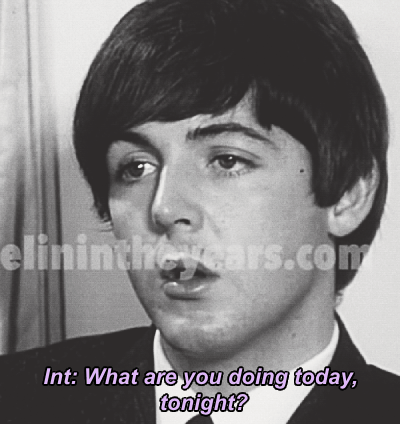
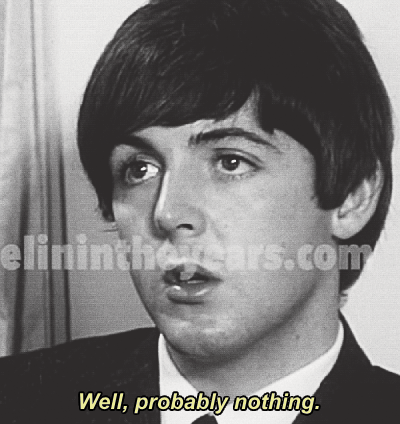

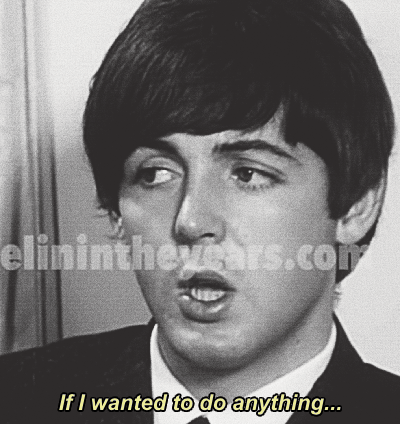
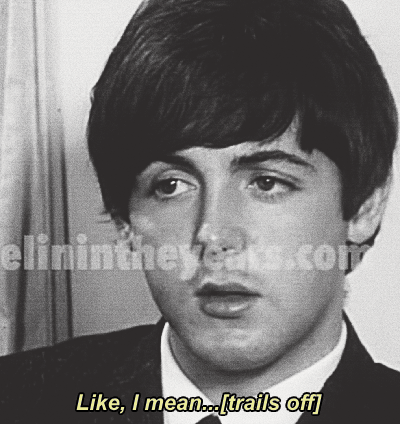
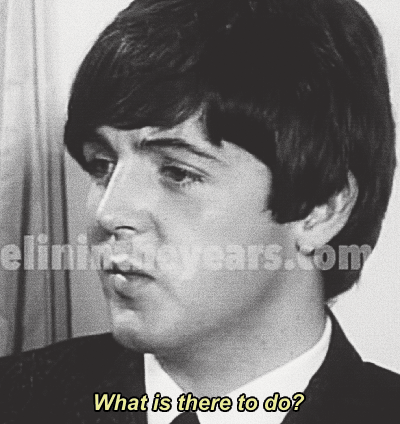
paul mccartney being me every night once i hit my mid 20s
895 notes
·
View notes
Text
“I didn’t want to do anything else”
#the beatles#beatles#paul mccartney#john lennon#george harrison#ringo starr#60s#beatles fan#beatles interview#1960s
435 notes
·
View notes
Text
'I look in the mirror'
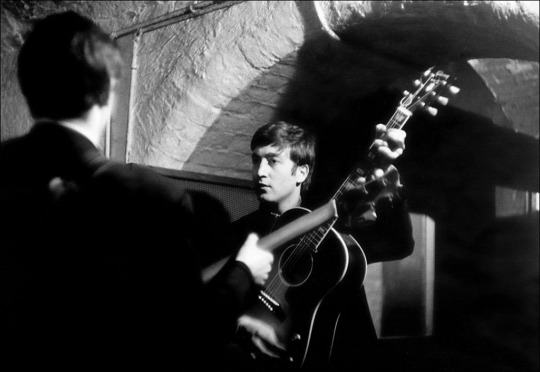
At the Cavern, 1963, photo by Michael Ward
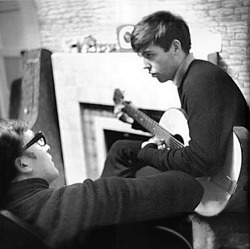
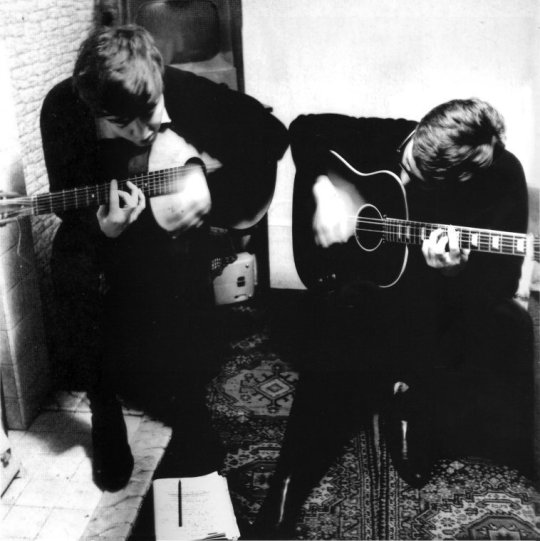
Photo by Mike McCartney
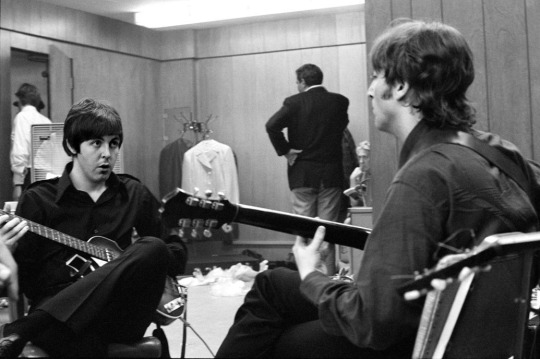
August 13, 1966, photo by Bob Bonis
We wrote with two guitars, John and I. And, as I’ve mentioned previously, the joy of that was that I was left-handed while he was right handed, so I was looking in a mirror and he was looking in a mirror. We would always tune up, have a ciggie, drink a cup of tea, start playing some stuff, look for an idea. Normally, one or the other of us would arrive with a fragment of a song. ‘Please Please Me’ was a John idea. John liked the double meaning of ‘please’. Yeah, ‘please’ is, you know, pretty please. ‘Please have intercourse with me. So, pretty please, have intercourse with me, I beg you to have intercourse with me.’ He liked that, and I liked that he liked that. This was the kind of thing we’d see in each other, the kind of thing in which we were matched up. We were in sync.
(Paul McCartney, about Please Please Me in The Lyrics, 2021)

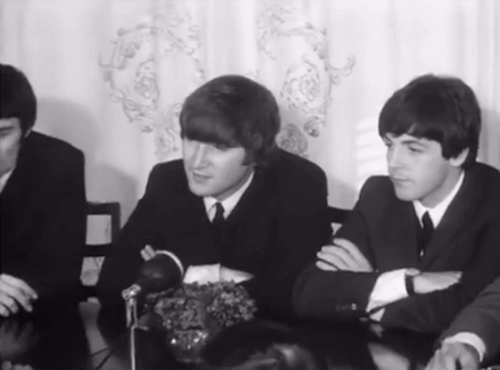
gifs by javelinbk
A lot of what we had going for us was that we were both good at noticing the stuff that just pops up, and grabbing it. And the other thing is that John and I had each other. If he was sort of stuck for a line, I could finish it. If I was stuck for somewhere to go, he could make a suggestion. We could suggest the way out of the maze to each other, which was a very handy thing to have. We inspired each other.
(Paul McCartney, about Eight Days A Week in The Lyrics, 2021)
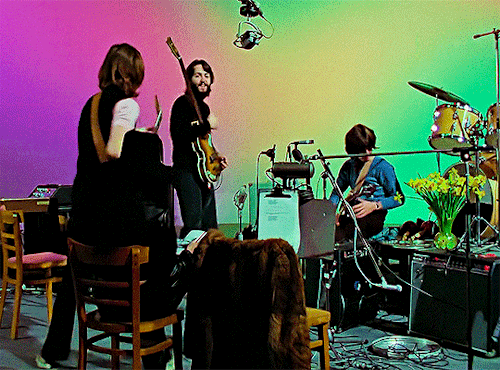
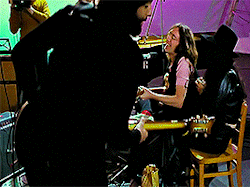
gifs by nikidontsurf
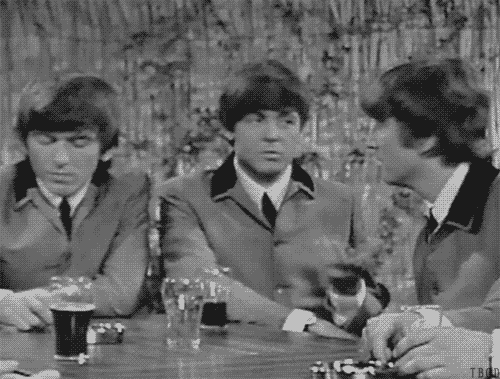
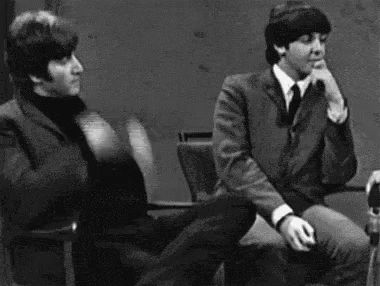
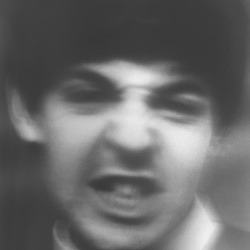

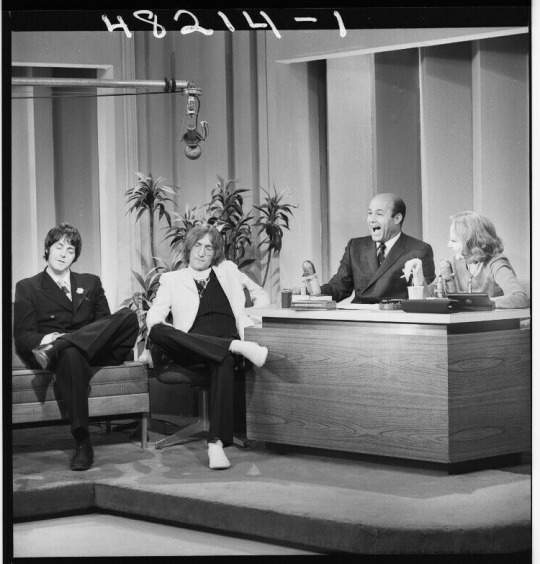
When John and I met, the first year of our friendship was spent talking about these cover versions, the records we loved, and then playing them again and again. As we got to know each other, we practised these various covers until one day the conversation went, ‘You know, I’ve written one or two songs.’ And he said, ‘Yeah, so have I.’ That gave us something in common that was itself wholly uncommon. I went to a school of a thousand boys and I’d never met anyone who said he’d written a song. Mine were just in my head. So were John’s. We took each other by surprise. And then the logical extension was, ‘Well, maybe we could write one together.’ So that’s how we started. And we became versions of each other.
(Paul McCartney, about The Other Me in The Lyrics, 2021)
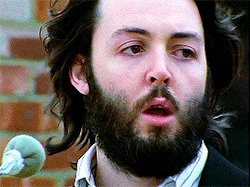


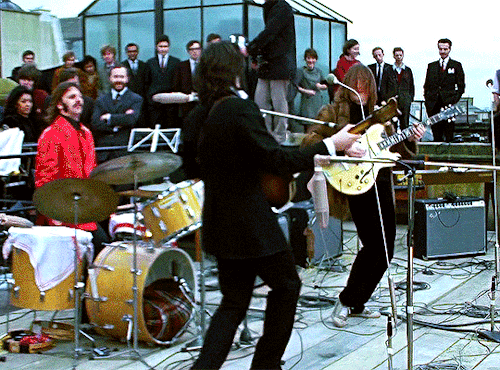
gifs by stewy
Q: "Can I ask you about Lewis Carroll?" A: "Oh, Lewis Carroll. I always admit to that because I love 'Alice In Wonderland' and 'Alice Through The Looking Glass.' But I didn't even know he'd written anything else. I was that ignorant. I just happened to get those for birthday presents as a child and liked them. And I usually read those two about once a year, because I still like them."
(John Lennon, June 16, 1965, interview for BBC)


Paul McCartney in his garden at Cavendish Avenue, 7; photo by Barry Lategan (for Observer 'What Makes A Man Stylish?', July 1968)
I think of the imagined world of Lewis Carroll [Alice's Adventures in Wonderland and Through the Looking-Glass, and What Alice Found There] that John and I both loved so much.
(Paul McCartney, about I’ll Get You in The Lyrics, 2021)
We’d been together so much that if you had a question, we would both pretty much come up with the same answer. [about their hitchhike to Spain by way of Paris] <…> It’s a bit crude, but it’s fair to say that, in general, I’d had a good life and John hadn’t. His life had been tougher, and he had to develop a harder shell than I did. He was quite a cynical guy but, as they say, with a heart of gold. A big softy, but his shield was hard. So that was very good for the two of us. Opposites attract. I could calm him down, and he could fire me up. We could see things in each other that the other needed to be complete.
(Paul McCartney about Ticket To Ride in The Lyrics, 2021)
youtube
Sometimes I look in the mirror Is nobody there? But I just keep on staring and staring No Can it be? Can it be? Can it be? And if I look in the mirror And nobody´s there But I just keep on staring, and staring No Is it me? Is it me? Is it me?
(John Lennon, circa 1977)
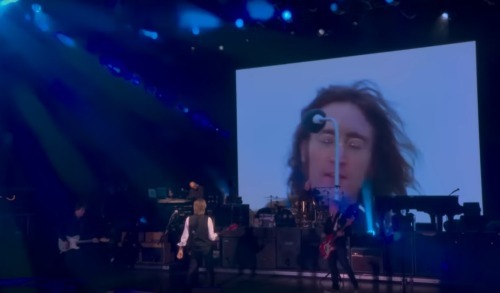
+ this
#'when making art we create a mirror in which someone may see their own hidden reflection' (Rick Rubin)#john lennon#paul mccartney#john and paul#mirror mirror (on the wall)#the songs we were singing#the nerk twins#Youtube#please please me#i'll get you#eight days a week#the other me#i've got a feeling#interview: paul#interview: john#lewis carroll#get back#peter jackson#the beatles#george harrison#ringo star
438 notes
·
View notes
Text
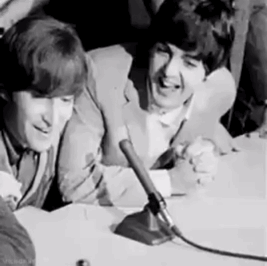
mama what is happening under that table
#the beatles#paul mccartney#john lennon#mclennon#gay people#what’s going on here#freaky ass interview
296 notes
·
View notes
Text
there’s always some quote from george about how he “quite enjoyed” paul’s shittiest projects (london town, give my regards to broad street) and that’s how you know george loved him fr
#no matter what george said about paul in interviews it speaks volumes that he actually sat through the entirety of broad street#and was like yeah that was fun 😭#george harrison#paul mccartney#the beatles
467 notes
·
View notes
Text
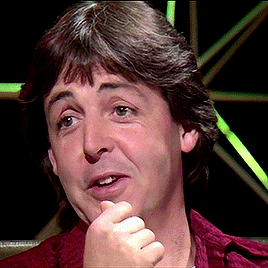

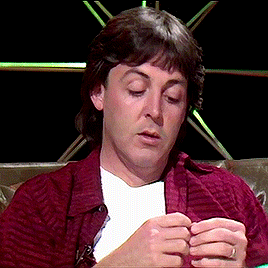
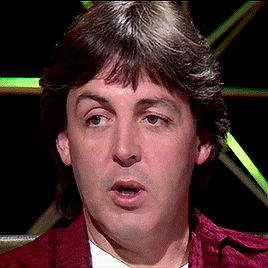


Paul in the "Meet Paul McCartney" interview to promote McCartney II, 1980 (x).
"I don't really feel like a lyricist. But I think at certain times I've done some good words. Erm, I feel easier with music, it's just the way I am, you know? It comes easier, it comes quicker."
"There's a song there called Nobody Knows, which... there's no way you could look at it as a set of lyrics and think 'that is strong lyrics'. But for me, actually- But still for me, I like the words on that. I mean, they're very simple, a lot of them have been done before, they don't actually say an awful lot except they say nobody knows. And actually, the more you think about that, and the more you think about all the millions of experts we have on the telly every night, everywhere, telling us how to do it, and a year later they're wrong or they're out of office, or the world isn't flat after all, and so I attach a lot of importance to just that idea of Nobody Knows and that's the way I like it, you see what I mean? It wouldn't be seen as a really good lyric but, you see the way I'm thinking about it, it is a good lyric, but it's- I approach a lot of stuff in that funny, kind of round about way, you know? Rather than just looking at it and saying that's a great bit of poetry. There's like, other reasons I think things make good words."
"I suppose if I'm being brutally honest, I wouldn't think I was getting better. But I put a lot of that down to just...paranoia. I think, like, always, if I go to the moment, like when I was writing what I think might be better songs, I know then I still didn't think I was much good. So I've never really thought I was much good, it's kinda what keeps me going really."
#paul mccartney#the beatles#mccartney ii#mine#80#ref:paul#paul#back on this interview again because a) LOOK AT HIM#and b) there's a bunch of quotes i really like#interesting little paul insights
336 notes
·
View notes
Text
"Life After the Bastards: 30 Years On, Macca Tells All"
"Blamed for the break-up for the biggest band in history, Paul McCartney downsized rapidly to cultivate a successful pop smallholding. Yet a bountiful solo career was always dominated by two famous partners, he tells Paul Du Noyer."
i said i'd do this ages ago and then the horrors happened, but this is a written up version of an interview by paul du noyer with paul mccartney from mojo's july 2001 issue.
sidenote: this seems to be the source for the claim that john thought "dear boy" was about him, which is why i bought the magazine because i haven't been able to find a digitized version of the interview and wanted to get the context. but it's a very fascinating interview just in general so it's definitely worth a read!

Wings were a band who seldom felt the feathery end of the critic's quill, but this year we're seeing Paul McCartney's biggest effort so far to rehabilitate the second most popular group he ever belonged to. He's released a double-CD and a documentary, both called Wingspan, that tell the story as he would like it told. And you soon realise that there's more than a muso's pride at stake in this project. "The great thing is," he says, "it vindicates Linda. I know she wanted to do the Wingspan thing. She knew if it was laid out correctly, people would get the idea. With all the slagging off she got, like the famous tape at Knebworth..." (This illicit cassette, from the mixing desk of a live show at the outdoor venue, was for years a dependable source of satirical mirth in music business circles; Linda McCartney's off-key vocals circumnavigate the chorus notes of Hey Jude, while anonymous engineers hoot cruelly.)
"The truth was," her loyal widower continues, "she was doing this (he stands, raises his hands to clap above his head). She was being the big cheerleader: 'Hey Jude, naah-naah-na.' But you don't see the visual, you just here this out-of-tune voice, and I know she always wanted the record put straight. And this does. You see her playing. You hear her singing beautifully. And you see what she was to the group. You see why she had to be in the group. She becomes the ballsiest member of it..."
He settles back on the sofa, here in the Soho office of his MPL company. Around his neck is a slim pink tie of the kind that Elvis used to wear. On his feet are trainers that look less like a gesture to trendiness than a concession to comfort. Just behind him is the Art Deco statuette that appears on a couple of Wings LP sleeves. The other great thing about the Wingspan film, he says,was being interviewed by his daughter Mary. (That's her face you can see, peeping out from Dad's jacket on the cover of the first solo LP, 31 years ago.) "I'd never had such a long natter with her, as doing this. And I used to say to my kids, You're the only ones who never ask me about The Beatles. Their friends would come round and say, 'What was it like being in The Beatles?' I'd go (adopts pompous old git voice), Well, let me tell you... And my kids would all go out the room: 'Oh bloody hell, he's off...' That's how kids are, they don't want to hear about that shit. But their friends would, so I'd chunder on..."
In fact he chunders on about The Beatles a lot more than you might expect. Or about one Beatle in particular, at least. The World's Most Famous Living Liverpudlian is anything but reticent when it comes to the World's Most Famous Dead Liverpudlian. It's quite contrary of him, because for the first 20 years after the group split up, he showed a stubborn reluctance to discuss the subject with his interviewers. They wanted to ask about John Lennon; he wanted to discuss Back To The Egg... Then came a reconciliation with his past that culminated in the Anthology exercise, when the moratorium on Beatle-talk was entirely lifted. And now, in 2001, when the promotional agenda has switched back to Wings, you almost have to coax him off the subject of John Lennon. Is it just force of habit, or maybe the need to exorcise some kind of long-nosed, bespectacled, sharp-tongued ghost inside his head?
Taste restrains Paul from claiming any posthumous victories over John, though it's no secret that he still has some differences with Yoko that are as wide as the Atlantic that normally separates them. But he can't resist smiling at the irony of Lennon spending his last few years championing the sort of domestic cosiness that was once a derided part of the McCartney stereotype.
"Yeah, it's lovely. But you're right to say they were stereotypes. Everyone thought John was the hard, working class hero. As you know, if you look at his house, he was actually the middle class one, from Woolton. We were the scruffs. He had the full Works Of Winston Churchill: nobody any of us knew had that. A set of encyclopedias was the most that anyone in our class had. But he had The Works Of Winston Churchill, and he'd read 'em, I think.
"There were so many stereotypes of John. And I love the fact that in the end- it's one of the great blessings of my life, seeing as he got shot- that during the last year, we made it up. Thank God for that. I would be just so fucked up now, if I'd still been arguing with him and that had happened. I was thinking about it just the other day. It was cool that I'd started ringing him. We'd had a bread strike over here and I rang him and I was saying, What are you doing? He says, 'I'm breaking some bread.' Oh! Me too! Imagine, with the stereotypes, John and Paul talking about baking bread. He'd just had Sean, and he was talking about just padding round the apartment in his dressing gown, putting the cat out and changing the baby.
"And I'd been doing all of that, and as you say, I'd been stereotyped for it. It was really warm to be able to talk to him that ordinarily, finally. It was like we'd got back to where we'd been when we were kids. It was like we could actually talk about stuff that didn't matter, but somehow it did matter..."
Back in 1970 neither John nor Paul, nor George or Ringo, would find The Beatles an easy beast to walk away from. Paul and Ringo seem to be at peace with it now; John would probably have become so; George never has. Besides the legal wranglings and the personal rancour that persisted between them for a while, there was the unique problem of getting used to living in a world that you no longer ruled.
Pop in the 1960s was like a pyramid. At the top obviously, were The Beatles. Around them and just below, were Dylan, the Stones, the deposed King Elvis, and so on down to the broad base of innumerable also-rans. But pop in the 1970s was more like range of mountain peaks, topped by anyone from Elton John to the Sex Pistols. There was also no unified hierarchy any more, and there hasn't been one since. McCartney can't have found the new world order an easy proposition. But he overcame his doubts the same way that he overcame his blacker periods in The Beatles. In other words, he worked.
It's one of those first post-mop top albums that we discuss in detail today. McCartney (1970) and Ram (1971) were curiously anti-climatic in their day. The first was home-grown, small-scale, contentedly modest, like a record made for his private diversion. The second was sprawling and eccentric, full of unfinished tunes and nonsense rhymes. This was an era when former Beatles were still expected to return from the mountain bearing tables of stone (which Lennon and Harrison certainly attempted to do), not these gaudy, giggling indulgences. Three decades later, McCartney and Ram have endured far better than anyone expected.
It's typical of McCartney, though, that he's still insecure about their worth. He has a peculiar, wrong-end-of-the-telescope way of assessing his talent. He tries to talk up McCartney by telling you that "Dave Stewart really likes it", or boasts that a hippy van driver once yelled across the LA traffic, "Ram! Great album dude!" Recently his girlfriend Heather Mills put it this way: "He is a genius but doesn't realise it, which is delightful."
Towards the end of The Beatles you were dying to get back to playing live in a band, weren't you? But your first move is to go the opposite way and do a totally solo album.
Yeah. I couldn't have another band because I wasn't sure The Beatles had actually broken up. It was on the cusp: we hadn't broken up when I started it, so it was just me doing some solo stuff. And then we had broken up, but things hung on. It basically started from John's decision to leave the band, which came when I said I think we should get back together and do some little gigs. And he said, "Well I think you're daft and I wasn't going to tell you until after we signed the Capitol deal but I'm leaving the band." (Mimes an axe falling) That was, like, The Moment The Beatles Broke Up. But it wasn't in the open until a few months later, when I issued the McCartney album and did this press release with it, which virtually had the announcement. I finally blew the whistle on it. And John was annoyed, even though he hadn't said anything. It turns out, he told me later, that he wanted to be the one who announced it. He was jealous that I beat him to it. But I felt that three or four months was enough to wait around. Either we were just going to fuck about for another year, or we had to actually say to people, "You know what? About three or four months ago we actually broke up." So that was how that happened.
So in your head, The Beatles were still together when you were making McCartney. Whereas the outside world heard it as "What Paul did after leaving The Beatles." I think it seemed a strangely low-key record, as a result.
No. It was on the cusp. There were a lot of funny things around at the time. Allen Klein: he was the one I wanted to sue to get out of it all. But everyone said, "He's not party to any of the agreements, he's just an outside guy. So you'll have to sue The Beatles." So I got into this terrifying thing of having to sue them, scared more than anything of the fact that, as you say, people would just see this album come out, hear my announcement and then hear I was suing The Beatles, without knowing any of the context. So I knew I was in for problems. And I tried my best in the press to say, "Oh, blah blah blah, it was Allen Klein, blah blah." So it was a shitty time for me. The only option was to either let him take it all, and the guys just swim along with him, or fight it. He said I was fine, "Don't worry, McCartney loves me" and all of this. And I knew I was hating the bastard. But to get out of him I had to sue the guys. And, as you know, Liverpool, the mates, no matter how much we were arguing, it's one thing you don't ever want to have to do. So I knew the perception of me would, like, be deadened from there on in. And I suppose in many ways I've been fighting that for 20 years. But it was a clear choice: do that and possibly save it all- or even lose it and pay the lawyers' bills, which was not a terrific option- or just let Klein take it all. 'Cos the others were just with him, gung ho. So I took the option of suing him and had to live with that perception, including: "This is what Paul's done as his first move after leaving The Beatles." Which was actually the nicest bit of the perception: I did an album after The Beatles, so what? The worst thing for me was, I sued my best mates. But the thing is, looking back on it, they now say "Thank you, you got us out of it, we wouldn't have Apple, there'd be no Anthology, no I record, it'd all be in someone else's pocket now." It was the right thing to do, but I knew I was walking into the Valley of the Shadow of Death. Very scary, but it was one of those moments in your life when you have to do it.
And, of course, we were hearing McCartney just after Abbey Road, which was at the opposite extreme.
Very produced, yeah.
Despite the problems going on around it, McCartney sounds a pretty cheerful affair.
Yeah, it was, because of Linda. I was just starting with Linda and in my mind the album was my escape from it all. I'd get home, new baby, that joy... any readers who've got a new baby, it transforms your life. I hadn't had a baby before, though we had Heather from Linda's first marriage. Home was a great solace for me, and making this record was "Yeah, this is what I love to do." The rest, outside, was shit, but coming inside it was like a little cocoon. So I either made the album all at home or went down to a little studio in Willesden. Lin and the baby in the control room. Young married life is a very special time. And I always liked doing things on my own. I was the kid in Liverpool who sort of went on a bus to the next stop, to Penny Lane, and got off and just looked around: "Who lives there?" I still like that, it's in my personality to just go somewhere and watch people. Last night I took the Tube home. We went to the theatre, couldn't get a taxi anywhere in the West End. I really get a charge off that. George never used to. His dad was a bus driver. I'd say to him, even when we were famous, I love getting on a bus. He'd say (astonished), "The bus? Why? You've got a car!" But you're just looking at people. And now of course, with fame, they're looking at me a bit.
There's one or two on the Tube last night, cracking up laughing. Guy in a baseball cap, decides he's got to cool himself out, pull it together, gets off at the same stop: "All right mate? Good luck!" So that's where the record got its happiness. And when the time came to release it, I finally had to deal with Mammon, which was Apple. Ring them up and say, "Er, can I have a release date?" Neil [Aspinall] gave me a date. I was kind of boycotting Apple, and Suddenly Mammon decided to change my release date for (adopts sarcastic tone) the massive Let It Be album. And I'm, "You fucking bastards! I've got a release date worked out! How can you do this?" I can't remember what happened, but I certainly shouted loud enough. So it was Rage Against The Machine, me against them. That's why it was a good album for me, and it's pretty funky, some of the little pieces like Momma Miss America have a great sound on them. I was like a professor in his laboratory. Very simple, as basic as you can get, a joy to make. (Scans the tracklist) Teddy Boy was good, I'd tried to make that with The Beatles but no one was having much patience with me. Maybe I'm Amazed was about the biggest song on it. And Kreen-Akrore was about an Amazon tribe I'd seen, who were fighting for survival, I went into the studio and recorded the sound of a bow and arrow going past the mike. Even now that album has an interesting sound. Very analogue, very direct.
The next album, Ram, is famous for its supposed attacks on John and Yoko, isn't it?
Well, Too Many People was a bit of a dig at John, because he was digging at me. We were digging at each other in the press. Not harsh, but pissed off with each other, basically.
Have I misheard, or does it really start with the words "Piss off"?
Yeah. Piss off, cake. Like, a piece of cake becomes a piss off cake. And it's nothing, it's so harmless really, just little digs. But the first line is about "too many people preaching practices". I felt John and Yoko were telling everyone what to do. And I felt we didn't need to be told what to do. The whole tenor of the Beatles thing had been, like, each to his own. Freedom. Suddenly it was, "You should do this." It was just a bit the wagging finger, and I was pissed off with it. So that one got to be athing about them. Once you start, the ball starts rolling. There was a picture that we had for Hallowe'en of the two of us in silly masks that we picked up at a kids' shop in New York. I'm Wimpey out of Popeye, and Linda was another character which looked a bit Oriental. We heard later that they thought that was a dig at them, but it actually wasn't. So when John did a piss-take [in a postcard given away with his Imagine LP], he held a pig instead of the ram. This wasn't posed. Me and Linda decided to catalogue all our sheep, so there's a photograph of me holding every bloody sheep in the flock. Over 100 of them. I was supposed to be cropped out.
Is that where the title came from?
I remember driving up to Liverpool at some point and deciding that Ram would be a good title for an album, then the picture came, and you can "ram" a door down, and a "ram" is a male, like a stag. It just seemed like a good word. Monkberry Moon Delight I liked, so much so that it's in my poetry book. "My long-haired lady." Very '70s. Ram On is a cute little thing on a ukelele, 'cos I used to carry one around with me in the back of New York taxis just to always have music with me. They thought I was a freak, those taxi-drivers. Uncle Albert/Admiral Halsey was an epic thing, a Number 1 in America, surprisingly enough. I like the bit that breaks in: "Admiral Halsey notified me, da-da-da, had a cup of tea and a butter pie." It's a bit surreal, but I was in a very free mood. I like all of that. It must have freaked a few people, 'cos it was quite daft. Back Seat Of My Car is very romantic: "We can make it to Mexico City." That's a really teenage song, with the stereotypical parent who doesn't agree, and the two lovers are going to take on the world: "We believe that we can't be wrong." I always like the underdog.
I think John might have taken Dear Boy as an attack on him.
Dear Boy wasn't getting at John. Dear Boy was actually a song to Linda's ex-husband. "I guess you never knew what you had missed." I never told him that, which was lucky, because he's since committed suicide. And it was a comment about him, 'cos I did think, "Gosh, you know, she's so amazing, I suppose you didn't get it.
The LP sounds like you had more tunes lying around than songs to use them in. A lot of the tracks are like medleys of different ideas.
Yeah, Long Haired Lady goes off a bit, Back Seat Of My Car goes off a bit, Big Barn Bed comes off Ram On, that's right.
No writer's block at that point, then?
No, I've been very lucky about writer's block, touch wood. It occurred to me the other day that me and John never sat down on, what was it, 295 songs me and John wrote? And on those 295 occasions, we never came away without a song, which is fucking phenomenal. The only time we nearly did, was Golden Rings, which became Drive My Car. It was "duh-duh duh-duh golden rings..." Um, this is not gonna compute. Finally, we had a ciggie and a cup of tea and our humour came back and Drive My Car came out of that. Some people analyse songwriting. I've never known about it. It's fingers crossed, every time I sit down to do it. I just dive right in and hope for the best, and it seems to work.
Were you feeling in competition with the other ex-Beatles, now?
Yeah, we were all in competition. Which was a weird thing, trying to avoid each other's release dates, like we'd avoided the Stones' release dates in The Beatles. When John or George released an album, I'd check it out, to see where he was up to. I think the truth, as a lot of people have said, is that we were missing each other. We missed the collaborative thing, of John saying, "Don't do that" or "Do that". Sparking each other off. For a while I was certainly very conscious of it. The only good thing was that I had been writing without John for a while, towards the end of The Beatles, so it wasn't as bad as it could have been. It was still a pretty big shock just not to be hanging out with these guys. 'Cos I'd hung out with them since I was 17.
Even when you were not writing together, on later Beatles records, there must have been a stage in the process where the others listened to your songs, and vetoed them or otherwise.
Exactly. John brought me Glass Onion. I remember him out in the garden in St John's wood saying, "What do you think of this?" We would just run it past each other, like you would run it past a mate or a producer. And he actually asked me, "D'you think I should put in this line about the Walrus was Paul?" I said, Oh yeah! It's brilliant. I just generally tended to agree with his stuff, and he tended to agree with mine- like in Hey Jude, i was going to knock out that line about "The movement you need is on your shoulder." He said, "You're not, that's the best line in it." So, often it wasn't negative but bolstering each other up. I might go through the whole studio experience thinking, This line's not right. But the minute he'd signed off on it, I thought, This line is ace! Similarly with him and Glass Onion. It was the strength of unity.
It's always striking that, of the four solo Beatles, George and Ringo got off to the strongest starts.
Yeah, George's All Things Must Pass. As he said, it was just like a diarrhea, he must have held it in for so long. And he had Phil [Spector] and a lot of really good people. And George was just so pissed off with us. I mean, all that anger just came out. Which is a good thing for an album, the "I'll show you" factor, which I had later in Band On The Run, when two of the members left the night before. So George and Ringo did get off to very good starts. John and I took it a bit hard, but all in all throughout the years we all did pretty well as single acts.
You formed a band for Ram, but it's not yet Wings.
Not yet, no. Denny Seiwell turns out to be in the band. Hugh McCracken who plays on a lot of it, who was nearly in the band. He came to Scotland to rehearse, but he was such a New York guy that he didn't really like to be away from America, and I can see that. New York is such a satisfying town, you can walk one block and get anything, whereas you can't do that in the Mull of Kintyre...
The first official line-up of Wings, which makes Wild Life, includes Denny Laine.
Denny came from The Moody Blues. I'd seen him when were out on tour with The Beatles and we'd played with them. My enduring memory is of one night up in somewhere like Edinburgh on tour, we'd had a few drinks and we decided that The Moody Blues would play The Beatles at snooker on this very beautiful, full-sized snooker table. Instead of being sensible and playing one at a time against each other, in a kind of league, they all got on one end of the table and we all got on the other, and I'm afraid the table got trashed. Oh shit. So I knew Denny, I knew we could get on personally and I liked his voice, particularly from Go Now, which I championed. I remember taking that around the BBC in its early days and saying, "Have you heard Go Now by The Moody Blues? It's my favourite record of the moment." And those producers would take notice of us. I was also used to having another lead voice in the group with me, so Denny became that.
And this time there's a friendlier song for John.
Dear Friend was to do with John, a bit of longing about John. Let's have a glass of wine and forget about it. A making up song.
Finally you do what The Beatles wouldn't agree to do, and get back on the road.
It seemed to me that for a band it's essential. We'd given it up in '67 with Sgt. Pepper when our new decree was, "The record will go on tour and we won't. We'll make a great record and send that out instead." But what happened after that was, we made some good records, but missed the stimulus of going out on tour. We missed seeing the whites of their eyes and getting a reality check: "They liked that one, they didn't like that one." And we hadn't done it for so long that my choice was, Either give up music, or continue to make it. I wanted The Beatles to go out as a live band, therefore I ought to go out as a live band. So we got a band and hatched the plan of going out on the university tour. Didn't want a big supergroup, a Blind Faith-style thing. I wanted to try and learn the whole thing again, hopefully learn some new things, rather than just repeat The Beatles things, which had all been done, and been about as successful as anyone in the world was ever gonna be.
But you took the informality to extremes, not even booking hotels.
No gigs or hotels or anything. Looking back, I can't believe we did that. We had the van, the dogs, the kids, and it was just madness. It was like I'd never been in The Beatles, I couldn't rely on any of that fame as a crutch. We went up to these universities, and fate had it that a lot of them were having exams. We didn't ring them up and ask if they'd be ready for us. And the other thing was we walked into power cuts: it was the time of the Great British Three Day Week. My image now is of trying to find our way around the dark North with a torch. Is anyone in? Like trying to find a gig in a mine. But we found a couple. Nottingham was one. Lancaster we played. Newcastle City Hall. Durham. When we did find places it was really cool. The students had a good time.
And you had the unfamiliar experience of handling money again.
Yeah, it had all been cheques and accounts and stuff, bank statements. And suddenly it was 50p on the door. So we came away with these bags of coins, which reminded me of Peter Sellers in Tom Thumb: One for you, two for me... We just counted them out in the van afterwards. Good experience, going through all those hardships, and it got us together as a band.
But that line-up wasn't to last, and nor did any Wings line-up. Why?
I've never actually thought about it. I know it happened but I've always blanked it. Probably, in my mind, a band is a democratic unit. Everyone has an equal vote, and in The Beatles for 10 years that had been the case. So if Ringo didn't like one of our songs, which wasn't often, Ringo could veto a Lennon & McCartney song. That meant everyone felt good about themselves. But in Wings that wasn't the case. I was the ex-Beatle. So I saw myself as the leader of the group, which I'd never been in The Beatles. There wasn't a leader in The Beatles. People had said that John was, and later people had said that I was, but neither of us ever acknowledged it. It wasn't the deal. People would ask, "Who's the leader of the group?" We'd say there wasn't one. I think once or twice in Hamburg, in the early days, John said, "I am." But we got pissed off, so it became a democracy. But Wings wasn't. It wasn't a dictatorship, but we weren't all equal.
By the '70s there was suddenly lots of other big acts: Led Zeppelin, T. Rex, Bowie, Pink Floyd, even The Osmonds in their way, or Abba. Was it difficult, as a Beatle, to adjust to the new landscape?
I knew it was going to be difficult. There was this thing of Follow The Beatles. You found yourself just one of the acts in the Hit Parade, rather than the undisputed leaders. But I knew by starting the group from scratch that we had to work our way up So anyone like Zeppelin or Bowie who'd been building during the '60s and had now arrived, naturally took precedence. You just had to understand that there are people bigger than you. And it gave us a benchmark. We thought, "We'll be as big as you one day." It was very weird for me, starting all over again. But it wasn't the world's worst thing. It was quite sobering, really. It's good to be knocked off your perch. There was a lot of that with Wings. Not only was I doing things for myself with the band, I was personally doing things for myself, living up in Scotland, mowing the field with my tractor. In The Beatles, the office used to buy your Christmas tree for you. Now I was buying my own Christmas tree. I enjoyed that . It's unhealthy to think you're the big cheese all the time. Within The Beatles, we each reminded each other that we weren't. But I think there is a big risk with stardom. I'd ring up a restaurant and say, Have you got a table? "Sorry sir, we're full booked." It's Paul McCartney here. "Oh! Certainly, Mr McCartney!" I've never been comfortable with it.
It seemed like you were uncomfortable with The Beatles' legacy for most of your time with Wings.
The thing about Wings was we bought into the myth that it could never be as good as The Beatles. I knew it was the world's most difficult thing to bite off. Everything we did was in the shadow of The Beatles, which had recently been this phenomenal band. So we did everything with quite a lot of paranoia. And it's only on looking back, that I think we did a lot of great work. You look at '76, we have this big, big tour, and at first everyone wants to know, "Is this gonna be a Beatles reunion? It's rumored that McCartney blah-blah-blah, George Harrison and Ringo Starr are going to join him on-stage, and John Lennon blah-blah-blah." So it was rumoured The Beatles were going to re-form. Even in our most successful year they were taking our success off us. It was, "Well maybe The Beatles will re-form, that would be good." But the great thing was that three weeks into the tour it was suddenly, "Who cares?" It doesn't matter. This is a great band. And at the end of it we go and set some big world record. So that's good to see. We did this thing that we set out to do. And we needn't have worried.
#paul mccartney#the beatles#wings#mclennon#this whole interview was super fascinating tbh....#like all the insane paul & john quotes aside it's just very interesting#i lost it at the story about the beatles vs the moody blues game of snooker lmfao#also saying here I don't think this is nearly enough to say john thought dear boy was about him#I think the interviewer maybe meant too many people bc that's what they were talking about before#did briefly go 'I should email this guy' and then I sat there like girl it's NOT that much of a mystery put it down
247 notes
·
View notes
Text






#george harrison#paul mccartney#jeff lynne#ringo starr#the beatles#my post#mcharrison#lynnison#Paul said that Jeff was George's boyfriend and criticized Jeff's haircut in the same interview
316 notes
·
View notes
Text




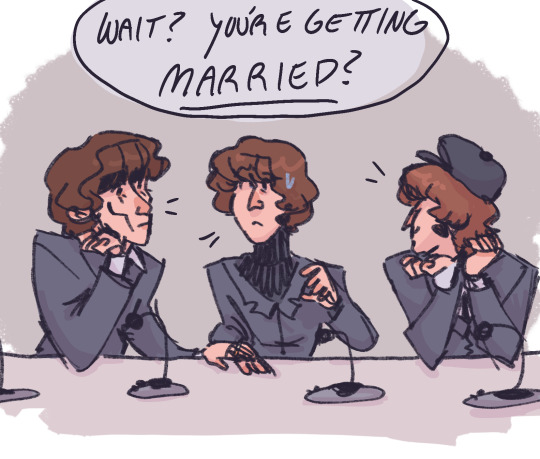


Dating
#Average beatles interview#the beatles#thebeatlesart#the beatles fanart#john lennon#ringo starr#george harrison#paul mccartney
380 notes
·
View notes
Text
"...which attracted US to him.''
191 notes
·
View notes
Text

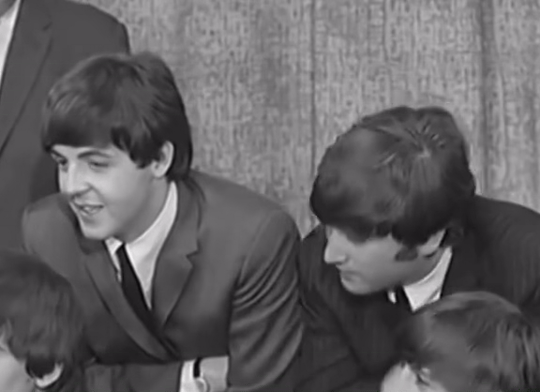
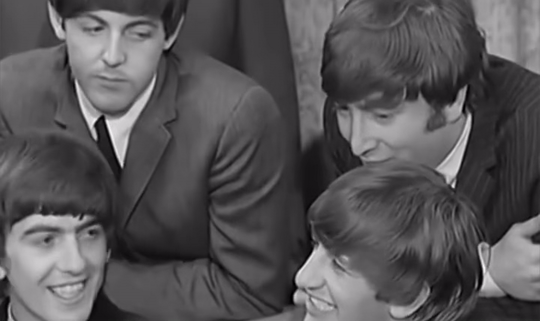

Look at me Oh, please look at me, my love Here I am Oh, my love
436 notes
·
View notes
Text

I like this one of John sort of screwing up his eyes, he’s obviously got trying to knock at soap, he’s washing his face, trying to not have soap in his eyes. But again, you know, that’s the kind of thing he’d let me take that picture. Because it’s just me. He knew… Well, he thought it was never gonna get publicised. Sorry, John. But no, you had that access and that intimacy, just because you lived on top of each other, you know. So it was really nice looking back at the photos, and reminded me of those days.
(Paul McCartney, June 2023, interview with Martha Kearney, BBC Radio 4's Today programme)
409 notes
·
View notes